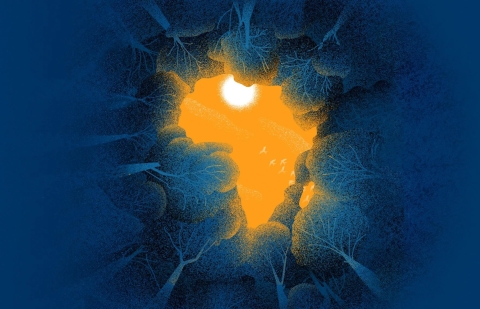
The Brookings Institution published the 2024 edition of Foresight Africa, offering a positive outlook for the continent despite serious challenges.
The following article was published in the March-April 2024 issue of NewsNotes.
In the introduction of the Brookings Institution’s annual report on what to expect for Africa in 2024, Aloysius Uche Ordo, overall editor of Foresight Africa 2024, names reasons to be “cautiously optimistic.” Despite difficulties in 2023, namely record high inflation, severe currency depreciations, and heavy debt burdens, he points to the research and analysis division of the British magazine The Economist that forecasts Africa to be the world’s second fastest-growing region, with 12 of the 20 fastest growing economies in 2024.
During a conference to launch the report on Jan. 26, a panel member commented on one of the theamatic issues named in the report: governance. Because of the many coups in Africa in recent years, we can now go from the coast of West Africa all the way to the Coast of East Africa and never set foot in a democratically elected country. But even elections are not a guarantee of democracy. The key question is legitimacy: is government just a colonial left-over or a real provider of services?
The first two issues named in the report, development financing and climate change, have interlinking components. The continent of Africa is positioned at the epicenter of the climate challenge and 2023 was the hottest year ever recorded. Africa bore the brunt of devastating climate impacts, as evidenced by drought in the Horn of Africa, cyclones in northern Mozambique, and torrential floods in more than a dozen countries. Yet Africa contributes least to this crisis, serves as the “lungs” of the world (Congo, Okavango and other river basins), and is a repository of critical minerals needed for the global energy transition. However, Africa receives the least amount of global financing to address this difficult collective problem.
The Brookings Institution recommends the following actionable goals: mobilizing domestic resources, strengthening financial systems, and ensuring that development funds are used as intended. It is also necessary that International Financial Institutions (IFIs) robustly increase the replenishments to their funds to enable African climate mitigation and adaptation, as well as to finance its energy transition.
There are twenty mineral-rich countries in Africa, as measured by those whose mineral exports comprise more than 25% of its exports. Africa needs an ambitious but practical approach to value addition, so that it is not just exporting commodities. Africa must become a strategic partner in the global community, which has the demand for Africa’s minerals. One promising initiative is the U.S. funded Lobito Corridor, a railway line from the DRC and Zambia, taking critical minerals to the port of Lobito in Angola for export to North America. The countries involved should make this a mature trade relationship, a true partnership.
Chapters three to five of the report grapple with the overwhelming necessity to create jobs in Africa. By the middle of this century one in four workers globally will be in Africa and, throughout this century, 90% of global workforce growth will be in Africa. The focus of Chapter Three is on empowerment of entrepreneurship in Africa, where most new jobs are created.
Chapter Four describes the efforts to scale up the Africa Continental Free Trade Area Agreement, which holds far greater opportunities of economic and job growth. Chapter Five discusses a key tool in job growth, namely technology, and specifically the digitization of services, commerce, education and other aspects of life in Africa. Many countries have developed national digital economy policies to foster innovation and entrepreneurship for both job creation and poverty reduction.
Chapter Six looks at the issue of gender. Wanjira Mathai writes that 30 million girls in Sub-Saharan Africa are not in primary school and 50 million are missing out of secondary school education. Women and girls have borne the brunt of all the recent shocks, such as environmental disasters, Covid, and high prices of food. Mathai says that the women themselves are confronting these challenges with courage, creativity and resilience and building solutions that make their communities safer and stronger. Policies and funding are needed to expand their access to education, including at the tertiary level, investment in clean energy and green tech sectors, and insistence on equality in political representation.
With regard to governance, the final chapter, the report states: “Declining resistance to military rule and tolerance of military intervention are more of a reaction to the failure of elected leaders to meet citizens’ democratic aspirations than an attraction to the military rule per se.” The report recommends strong condemnation of coups by the African Union and regional economic communities, and aid conditionality to promote democracy and human rights. The report has 77 authors of whom nearly half are women.
Read the full report here: https://mogc.info/Foresight2024
Graphic from the cover of Foresight Africa 2024.
